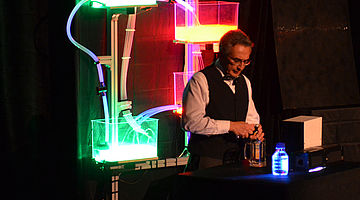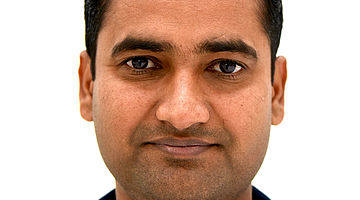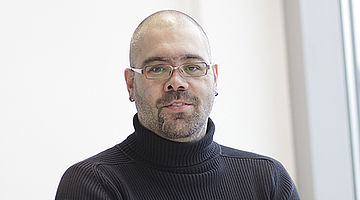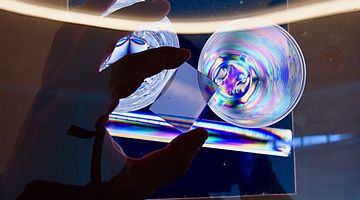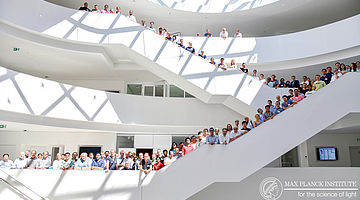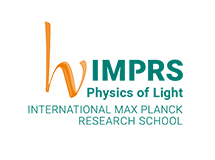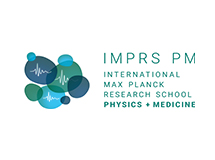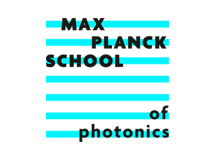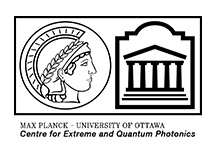- Home
- News & Events
- News from the Institute
Artificial intelligence predicts the future of artificial intelligence research
It has become nearly impossible for human researchers to keep track of the overwhelming abundance of scientific publications in the field of artificial intelligence and to stay up-to-date with advances. Scientists in an international team led by Mario Krenn from the Max-Planck Institute for the Science of Light have now developed an AI algorithm that not only assists researchers in orienting themselves systematically but also predictively guides them in the direction in which their own research field is likely to evolve. This work was published in the prestigious journal Nature Machine Intelligence.

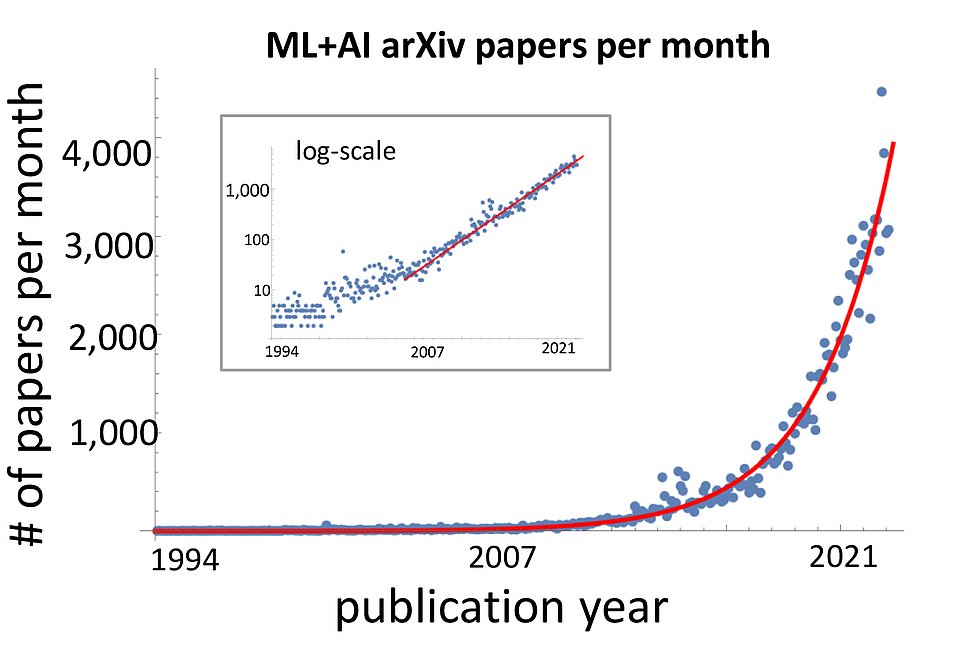
In the field of artificial intelligence (AI) and machine learning (ML), the number of scientific publications is growing exponentially and approximately doubling every 23 months. For human researchers, it is nearly impossible to keep up with progress and maintain a comprehensive overview. Mario Krenn, research group leader at the Max-Planck Institute for the Science of Light in Erlangen, approaches the solution to this challenge in an unconventional way. He has developed a new graph-based tool, 'Science4Cast,' which allows for posing questions about the future development of AI research.
Prior to this, the international research group had announced the 'Science4Cast' competition with the aim of capturing and predicting the development of scientific concepts in the field of AI research, determining which topics will be the focus of future research. More than 50 contributions with different approaches were submitted. Krenn, together with the top-ranking teams, has now examined the various methods applied, ranging from purely statistical to purely learning methods, and arrived at surprising results. 'The most effective methods use a carefully curated set of network features and not a continuous AI approach,' said Mario Krenn. This suggests significant potential that can be unlocked using pure ML approaches without human knowledge.
Science4Cast is a graph-based representation of knowledge which becomes more complex over time as more scientific articles are published. Each node in the graph represents a concept in AI, and the connections between nodes indicate whether and when two concepts were studied together. For example, the question 'What will happen' can be described as a mathematical question about the further development of the graph. Science4Cast is fed with real data from over 100,000 scientific publications spanning a 30-year period, resulting in a total of 64,000 nodes.
However, predicting what researchers will work on in the future is just a first step. In their work the researchers describe how further development of Science4Cast could soon provide personalized suggestions for individual scientists regarding their future research projects. 'Our ambition is to develop a method that serves as an inspiration source for scientists - almost like an artificial muse. This could potentially accelerate the progress of science in the future' explains Krenn.
Original publication in Nature Machine Intelligence:
Krenn, M., Buffoni, L., Coutinho, B. et al. "Forecasting the future of artificial intelligence with machine learning-based link prediction in an exponentially growing knowledge network"
DOI: 10.1038/s42256-023-00735-0
www.nature.com/articles/s42256-023-00735-0
Scientific contact:
Dr. Mario Krenn
Head of research group ›Artificial Scientist Lab‹ at the Max Planck Institute for the Science of Light.
www.mpl.mpg.de / mario.krenn@mpl.mpg.de
Image 1 (@Mario Krenn): The number of scientific articles in the field of artificial intelligence is growing exponentially, making it very challenging for scientists to keep up with the latest developments in the field.
Image 2 (Artistic Representation): An artificial intelligence contemplates the future of science (generated by OpenAI's DALL-E3).
Artificial intelligence predicts the future of artificial intelligence research
It has become nearly impossible for human researchers to keep track of the overwhelming abundance of scientific publications in the field of artificial intelligence and to stay up-to-date with advances. Scientists in an international team led by Mario Krenn from the Max-Planck Institute for the Science of Light have now developed an AI algorithm that not only assists researchers in orienting themselves systematically but also predictively guides them in the direction in which their own research field is likely to evolve. This work was published in the prestigious journal Nature Machine Intelligence.


In the field of artificial intelligence (AI) and machine learning (ML), the number of scientific publications is growing exponentially and approximately doubling every 23 months. For human researchers, it is nearly impossible to keep up with progress and maintain a comprehensive overview. Mario Krenn, research group leader at the Max-Planck Institute for the Science of Light in Erlangen, approaches the solution to this challenge in an unconventional way. He has developed a new graph-based tool, 'Science4Cast,' which allows for posing questions about the future development of AI research.
Prior to this, the international research group had announced the 'Science4Cast' competition with the aim of capturing and predicting the development of scientific concepts in the field of AI research, determining which topics will be the focus of future research. More than 50 contributions with different approaches were submitted. Krenn, together with the top-ranking teams, has now examined the various methods applied, ranging from purely statistical to purely learning methods, and arrived at surprising results. 'The most effective methods use a carefully curated set of network features and not a continuous AI approach,' said Mario Krenn. This suggests significant potential that can be unlocked using pure ML approaches without human knowledge.
Science4Cast is a graph-based representation of knowledge which becomes more complex over time as more scientific articles are published. Each node in the graph represents a concept in AI, and the connections between nodes indicate whether and when two concepts were studied together. For example, the question 'What will happen' can be described as a mathematical question about the further development of the graph. Science4Cast is fed with real data from over 100,000 scientific publications spanning a 30-year period, resulting in a total of 64,000 nodes.
However, predicting what researchers will work on in the future is just a first step. In their work the researchers describe how further development of Science4Cast could soon provide personalized suggestions for individual scientists regarding their future research projects. 'Our ambition is to develop a method that serves as an inspiration source for scientists - almost like an artificial muse. This could potentially accelerate the progress of science in the future' explains Krenn.
Original publication in Nature Machine Intelligence:
Krenn, M., Buffoni, L., Coutinho, B. et al. "Forecasting the future of artificial intelligence with machine learning-based link prediction in an exponentially growing knowledge network"
DOI: 10.1038/s42256-023-00735-0
www.nature.com/articles/s42256-023-00735-0
Scientific contact:
Dr. Mario Krenn
Head of research group ›Artificial Scientist Lab‹ at the Max Planck Institute for the Science of Light.
www.mpl.mpg.de / mario.krenn@mpl.mpg.de
Image 1 (@Mario Krenn): The number of scientific articles in the field of artificial intelligence is growing exponentially, making it very challenging for scientists to keep up with the latest developments in the field.
Image 2 (Artistic Representation): An artificial intelligence contemplates the future of science (generated by OpenAI's DALL-E3).
Artificial intelligence predicts the future of artificial intelligence research
It has become nearly impossible for human researchers to keep track of the overwhelming abundance of scientific publications in the field of artificial intelligence and to stay up-to-date with advances. Scientists in an international team led by Mario Krenn from the Max-Planck Institute for the Science of Light have now developed an AI algorithm that not only assists researchers in orienting themselves systematically but also predictively guides them in the direction in which their own research field is likely to evolve. This work was published in the prestigious journal Nature Machine Intelligence.


In the field of artificial intelligence (AI) and machine learning (ML), the number of scientific publications is growing exponentially and approximately doubling every 23 months. For human researchers, it is nearly impossible to keep up with progress and maintain a comprehensive overview. Mario Krenn, research group leader at the Max-Planck Institute for the Science of Light in Erlangen, approaches the solution to this challenge in an unconventional way. He has developed a new graph-based tool, 'Science4Cast,' which allows for posing questions about the future development of AI research.
Prior to this, the international research group had announced the 'Science4Cast' competition with the aim of capturing and predicting the development of scientific concepts in the field of AI research, determining which topics will be the focus of future research. More than 50 contributions with different approaches were submitted. Krenn, together with the top-ranking teams, has now examined the various methods applied, ranging from purely statistical to purely learning methods, and arrived at surprising results. 'The most effective methods use a carefully curated set of network features and not a continuous AI approach,' said Mario Krenn. This suggests significant potential that can be unlocked using pure ML approaches without human knowledge.
Science4Cast is a graph-based representation of knowledge which becomes more complex over time as more scientific articles are published. Each node in the graph represents a concept in AI, and the connections between nodes indicate whether and when two concepts were studied together. For example, the question 'What will happen' can be described as a mathematical question about the further development of the graph. Science4Cast is fed with real data from over 100,000 scientific publications spanning a 30-year period, resulting in a total of 64,000 nodes.
However, predicting what researchers will work on in the future is just a first step. In their work the researchers describe how further development of Science4Cast could soon provide personalized suggestions for individual scientists regarding their future research projects. 'Our ambition is to develop a method that serves as an inspiration source for scientists - almost like an artificial muse. This could potentially accelerate the progress of science in the future' explains Krenn.
Original publication in Nature Machine Intelligence:
Krenn, M., Buffoni, L., Coutinho, B. et al. "Forecasting the future of artificial intelligence with machine learning-based link prediction in an exponentially growing knowledge network"
DOI: 10.1038/s42256-023-00735-0
www.nature.com/articles/s42256-023-00735-0
Scientific contact:
Dr. Mario Krenn
Head of research group ›Artificial Scientist Lab‹ at the Max Planck Institute for the Science of Light.
www.mpl.mpg.de / mario.krenn@mpl.mpg.de
Image 1 (@Mario Krenn): The number of scientific articles in the field of artificial intelligence is growing exponentially, making it very challenging for scientists to keep up with the latest developments in the field.
Image 2 (Artistic Representation): An artificial intelligence contemplates the future of science (generated by OpenAI's DALL-E3).
Artificial intelligence predicts the future of artificial intelligence research
It has become nearly impossible for human researchers to keep track of the overwhelming abundance of scientific publications in the field of artificial intelligence and to stay up-to-date with advances. Scientists in an international team led by Mario Krenn from the Max-Planck Institute for the Science of Light have now developed an AI algorithm that not only assists researchers in orienting themselves systematically but also predictively guides them in the direction in which their own research field is likely to evolve. This work was published in the prestigious journal Nature Machine Intelligence.


In the field of artificial intelligence (AI) and machine learning (ML), the number of scientific publications is growing exponentially and approximately doubling every 23 months. For human researchers, it is nearly impossible to keep up with progress and maintain a comprehensive overview. Mario Krenn, research group leader at the Max-Planck Institute for the Science of Light in Erlangen, approaches the solution to this challenge in an unconventional way. He has developed a new graph-based tool, 'Science4Cast,' which allows for posing questions about the future development of AI research.
Prior to this, the international research group had announced the 'Science4Cast' competition with the aim of capturing and predicting the development of scientific concepts in the field of AI research, determining which topics will be the focus of future research. More than 50 contributions with different approaches were submitted. Krenn, together with the top-ranking teams, has now examined the various methods applied, ranging from purely statistical to purely learning methods, and arrived at surprising results. 'The most effective methods use a carefully curated set of network features and not a continuous AI approach,' said Mario Krenn. This suggests significant potential that can be unlocked using pure ML approaches without human knowledge.
Science4Cast is a graph-based representation of knowledge which becomes more complex over time as more scientific articles are published. Each node in the graph represents a concept in AI, and the connections between nodes indicate whether and when two concepts were studied together. For example, the question 'What will happen' can be described as a mathematical question about the further development of the graph. Science4Cast is fed with real data from over 100,000 scientific publications spanning a 30-year period, resulting in a total of 64,000 nodes.
However, predicting what researchers will work on in the future is just a first step. In their work the researchers describe how further development of Science4Cast could soon provide personalized suggestions for individual scientists regarding their future research projects. 'Our ambition is to develop a method that serves as an inspiration source for scientists - almost like an artificial muse. This could potentially accelerate the progress of science in the future' explains Krenn.
Original publication in Nature Machine Intelligence:
Krenn, M., Buffoni, L., Coutinho, B. et al. "Forecasting the future of artificial intelligence with machine learning-based link prediction in an exponentially growing knowledge network"
DOI: 10.1038/s42256-023-00735-0
www.nature.com/articles/s42256-023-00735-0
Scientific contact:
Dr. Mario Krenn
Head of research group ›Artificial Scientist Lab‹ at the Max Planck Institute for the Science of Light.
www.mpl.mpg.de / mario.krenn@mpl.mpg.de
Image 1 (@Mario Krenn): The number of scientific articles in the field of artificial intelligence is growing exponentially, making it very challenging for scientists to keep up with the latest developments in the field.
Image 2 (Artistic Representation): An artificial intelligence contemplates the future of science (generated by OpenAI's DALL-E3).
Artificial intelligence predicts the future of artificial intelligence research
It has become nearly impossible for human researchers to keep track of the overwhelming abundance of scientific publications in the field of artificial intelligence and to stay up-to-date with advances. Scientists in an international team led by Mario Krenn from the Max-Planck Institute for the Science of Light have now developed an AI algorithm that not only assists researchers in orienting themselves systematically but also predictively guides them in the direction in which their own research field is likely to evolve. This work was published in the prestigious journal Nature Machine Intelligence.


In the field of artificial intelligence (AI) and machine learning (ML), the number of scientific publications is growing exponentially and approximately doubling every 23 months. For human researchers, it is nearly impossible to keep up with progress and maintain a comprehensive overview. Mario Krenn, research group leader at the Max-Planck Institute for the Science of Light in Erlangen, approaches the solution to this challenge in an unconventional way. He has developed a new graph-based tool, 'Science4Cast,' which allows for posing questions about the future development of AI research.
Prior to this, the international research group had announced the 'Science4Cast' competition with the aim of capturing and predicting the development of scientific concepts in the field of AI research, determining which topics will be the focus of future research. More than 50 contributions with different approaches were submitted. Krenn, together with the top-ranking teams, has now examined the various methods applied, ranging from purely statistical to purely learning methods, and arrived at surprising results. 'The most effective methods use a carefully curated set of network features and not a continuous AI approach,' said Mario Krenn. This suggests significant potential that can be unlocked using pure ML approaches without human knowledge.
Science4Cast is a graph-based representation of knowledge which becomes more complex over time as more scientific articles are published. Each node in the graph represents a concept in AI, and the connections between nodes indicate whether and when two concepts were studied together. For example, the question 'What will happen' can be described as a mathematical question about the further development of the graph. Science4Cast is fed with real data from over 100,000 scientific publications spanning a 30-year period, resulting in a total of 64,000 nodes.
However, predicting what researchers will work on in the future is just a first step. In their work the researchers describe how further development of Science4Cast could soon provide personalized suggestions for individual scientists regarding their future research projects. 'Our ambition is to develop a method that serves as an inspiration source for scientists - almost like an artificial muse. This could potentially accelerate the progress of science in the future' explains Krenn.
Original publication in Nature Machine Intelligence:
Krenn, M., Buffoni, L., Coutinho, B. et al. "Forecasting the future of artificial intelligence with machine learning-based link prediction in an exponentially growing knowledge network"
DOI: 10.1038/s42256-023-00735-0
www.nature.com/articles/s42256-023-00735-0
Scientific contact:
Dr. Mario Krenn
Head of research group ›Artificial Scientist Lab‹ at the Max Planck Institute for the Science of Light.
www.mpl.mpg.de / mario.krenn@mpl.mpg.de
Image 1 (@Mario Krenn): The number of scientific articles in the field of artificial intelligence is growing exponentially, making it very challenging for scientists to keep up with the latest developments in the field.
Image 2 (Artistic Representation): An artificial intelligence contemplates the future of science (generated by OpenAI's DALL-E3).
Artificial intelligence predicts the future of artificial intelligence research
It has become nearly impossible for human researchers to keep track of the overwhelming abundance of scientific publications in the field of artificial intelligence and to stay up-to-date with advances. Scientists in an international team led by Mario Krenn from the Max-Planck Institute for the Science of Light have now developed an AI algorithm that not only assists researchers in orienting themselves systematically but also predictively guides them in the direction in which their own research field is likely to evolve. This work was published in the prestigious journal Nature Machine Intelligence.


In the field of artificial intelligence (AI) and machine learning (ML), the number of scientific publications is growing exponentially and approximately doubling every 23 months. For human researchers, it is nearly impossible to keep up with progress and maintain a comprehensive overview. Mario Krenn, research group leader at the Max-Planck Institute for the Science of Light in Erlangen, approaches the solution to this challenge in an unconventional way. He has developed a new graph-based tool, 'Science4Cast,' which allows for posing questions about the future development of AI research.
Prior to this, the international research group had announced the 'Science4Cast' competition with the aim of capturing and predicting the development of scientific concepts in the field of AI research, determining which topics will be the focus of future research. More than 50 contributions with different approaches were submitted. Krenn, together with the top-ranking teams, has now examined the various methods applied, ranging from purely statistical to purely learning methods, and arrived at surprising results. 'The most effective methods use a carefully curated set of network features and not a continuous AI approach,' said Mario Krenn. This suggests significant potential that can be unlocked using pure ML approaches without human knowledge.
Science4Cast is a graph-based representation of knowledge which becomes more complex over time as more scientific articles are published. Each node in the graph represents a concept in AI, and the connections between nodes indicate whether and when two concepts were studied together. For example, the question 'What will happen' can be described as a mathematical question about the further development of the graph. Science4Cast is fed with real data from over 100,000 scientific publications spanning a 30-year period, resulting in a total of 64,000 nodes.
However, predicting what researchers will work on in the future is just a first step. In their work the researchers describe how further development of Science4Cast could soon provide personalized suggestions for individual scientists regarding their future research projects. 'Our ambition is to develop a method that serves as an inspiration source for scientists - almost like an artificial muse. This could potentially accelerate the progress of science in the future' explains Krenn.
Original publication in Nature Machine Intelligence:
Krenn, M., Buffoni, L., Coutinho, B. et al. "Forecasting the future of artificial intelligence with machine learning-based link prediction in an exponentially growing knowledge network"
DOI: 10.1038/s42256-023-00735-0
www.nature.com/articles/s42256-023-00735-0
Scientific contact:
Dr. Mario Krenn
Head of research group ›Artificial Scientist Lab‹ at the Max Planck Institute for the Science of Light.
www.mpl.mpg.de / mario.krenn@mpl.mpg.de
Image 1 (@Mario Krenn): The number of scientific articles in the field of artificial intelligence is growing exponentially, making it very challenging for scientists to keep up with the latest developments in the field.
Image 2 (Artistic Representation): An artificial intelligence contemplates the future of science (generated by OpenAI's DALL-E3).
December
Bavarian Maximiliansorden
Director Prof. Dr. Gerd Leuchs received the Bavarian Maximiliansorden for Science and Art. The award was officially presented on Monday, December 17th…
Let there be light
At the traditional christmas lecture of the Friedrich-Alexander-University (FAU) on December 13th, everything revolved around visible and invisible…
November
AAAS and MPL Announce 2018 Fellows
Prof. Dr. Gerd Leuchs has been named a Fellow of the American Association for the Advancement of Science (AAAS). Election as a AAAS Fellow is an honor…
Peter Hommelhoff becomes MPL Fellow
As of November 2018, Prof. Dr. Peter Hommelhoff, who holds the Chair of Laser Physics at the Friedrich-Alexander-University Erlangen-Nuremberg, will…
October
New MPL Research Group
We are happy to announce that as of October 2018, Kanwarpal Singh started his work at MPL as head of a new Research Group. Kanwarpal, who previously…
Jochen Guck becomes new director at MPL
As of Oktober 2018, Prof. Guck will lead the new MPL-Division "Physics & Medicine".
We would like to warmly welcome our new director Jochen Guck: As…
September
Laser Swords at Max Planck Day
On September 14th MPL, along with all other Max Planck Institutes, opened its doors to the general public. Some 700 visitors from Erlangen and the…
August
Herbert-Walther Award 2018
On March 7 2018, at a ceremony held during the Spring Meeting of the Deutsche Physikalische Gesellschaft (DPG), Gerd Leuchs received the 2018 Herbert…
Symposium for the Science of Light 2018
A Symposium for the Science of Light took place 23 to 26 July, in celebration of 150 years of optics in Erlangen, 15 years since the formation of the…
July
June
May
April
March
February
January
New Max Planck Research Group
As of January 2018, Silvia Viola Kusminskiy has taken up her position as the head of a new Max Planck Research Group (MPRG). Her group "Theory of…
Contact
Edda Fischer
Head of Communication and Marketing
Phone: +49 (0)9131 7133 805
MPLpresse@mpl.mpg.de
© Max Planck Institute for the Science of Light
Data Collection
This website uses cookies to ensure you get the best experience on our website.


